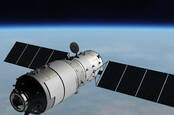This article is more than 1 year old
China to offer recoverable satellites-as-a-service
Promises launches by 2020, no word on whether wooden heat shields will make a comeback
China’s told the world it plans to get into the recoverable satellite business.
The nation’s launched and recovered satellites since the 1960s. Early missions may have been surveillance efforts that returned films to Earth to provide photographic reconnaissance. More recent missions have allowed experiments to be conducted in microgravity, an environment China feels is a fine place to grow seeds that produce hardier plants than their terra-bound cousins.
China Academy of Space Technology (CAST) president Zhang Hongtai last week told China Central Television that "We plan to upgrade this technology in order to satisfy the needs of commercial users." State-owned organ Xinhua said Zhang added his opinion that “recoverable satellites will be able to play an important role in space biology, space medicine and space scientific experiments.”
CAST will therefore start to look for customers and hopes to build the industrial ecosystem to sustain a commercial returnable satellite industry.
Other nations have also launched recoverable satellites, but they seem to be out of fashion at present. Those who wish to conduct cheap microgravity experiments often turn to sounding rockets, which offer only a few minutes of space flight and no return trip. The International Space Station offers weeks or even years of microgravity conditions, plus a reasonably regular taxi service to return samples to earth.
The USA’s X-37B space plane also offers the chance to stay in space for months at a time, but appears to be exclusively for military use.
China’s betting that there’s a market for commercial recoverables, a service The Register can’t see offered by any other nation or corporation. China thinks it’ll have its service up and running within two years.
One detail that space-watchers will wait for with bated breath is the composition of the satellites’ heat shields, as early Chinese recoverable satellites used oak wood to prevent the birds burning up as they de-orbited. ®

